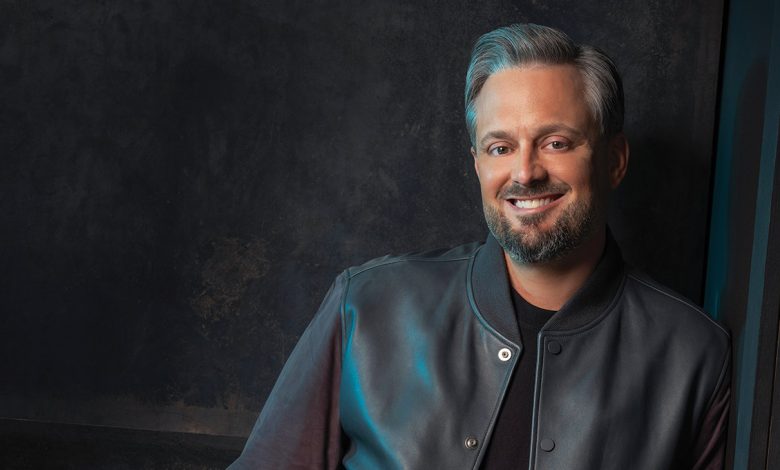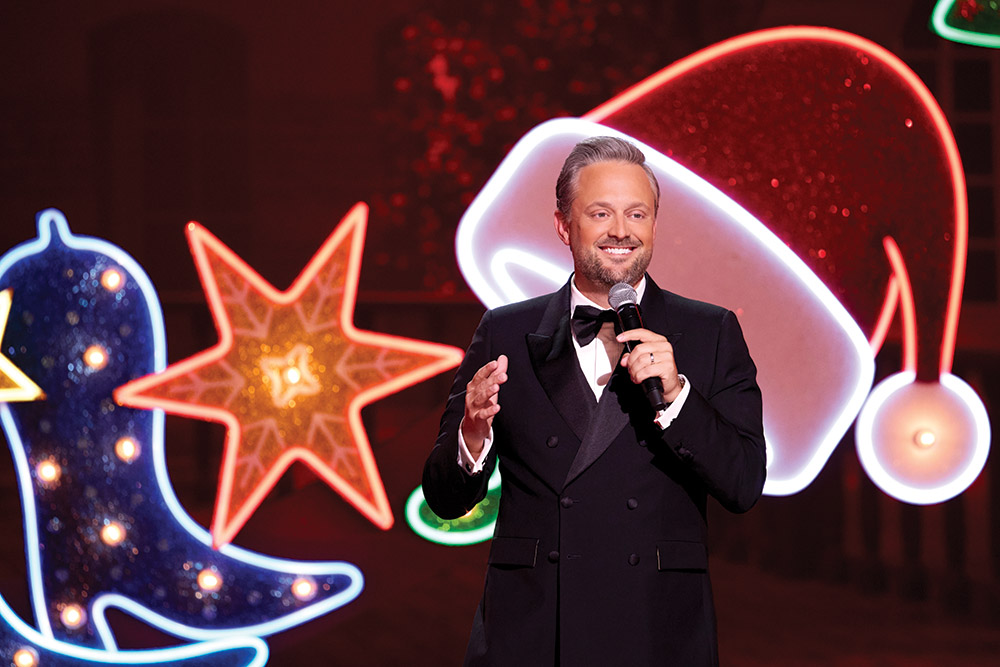How Nate Bargatze Conquered Comedy… After Failing Many Auditions

Appearing on Jimmy Fallon’s Tonight Show a record 13 times certainly boosted Nate Bargatze‘s profile — as did his quick succession of stand-up specials, the majority of them via Netflix. Nothing, however, compares to a visibility bump from hosting Saturday Night Live, which he did for the first time in the fall of 2023. “It changed everything in my life,” he says now, “or just sped it up to where we shot out of a rocket and now we’re just trying to keep our feet on the ground.”
In the year or so since, Bargatze, a married father of one, solidified his status as the No. 1 earning comedian in the world, according to Pollstar, and was invited back to SNL this fall. The Tennessee native, who followed his magician dad into the entertainment business, also founded a family-friendly content company, Nateland Entertainment, and over the course of a single week this month will emcee a Lorne Michaels-produced holiday variety show for CBS, release his third solo stand-up special for Netflix and serve as a special guest on NFL Christmas Gameday. He took time out to dish.
In 2014, you were making a Fallon-produced sitcom pilot that you believed would be, as you put it, “life-changing.” Presumably, you thought TV would be your ticket?
I absolutely did. And when it was happening, I remember my buddy was like, “This is your shot, so if it doesn’t work, that’s it.” I was kind of annoyed by that at the time, but I think it helped me. It put a little chip on my shoulder. I thought for sure it would go. When I look back, I’m very glad it didn’t.
How come?
Because I have a lot more control of where I want to go now, and I don’t think I would’ve had that then. I would’ve been too young and not a good enough comedian or performer yet. I look back on a lot of stuff that, had I gotten it, my career could have gone in a very different direction. Like, I auditioned for The Daily Show, and it got down to me and Jordan Klepper. And he got it because he’s appropriate for the show and I was a mess. Just terrible.
You almost had sitcoms at NBC, Fox, ABC, Netflix … Was there any kind of throughline to the feedback?
No, but I don’t think there was a lot of entertainment made for people not on the coasts during that period. They would tell you they wanted multicams and stuff that’s [designed for] co-viewing, but then you’d pitch one to people who are not watching multicams. They want them because it looks good on their budget, but then they’re like, “Well, this show’s not fun.” Yeah, because this show is not made for you! So it was a lot of that for a long time. But now it’s shifting and everyone seems to want broader again.
Does that mean they’re now banging on your door?
They’ve asked a lot. The thing is, I don’t know if I’d do a sitcom now. I’m trying to do the movies and build Nateland, but I’ve definitely taken some stuff out. We have a comic, Derrick Stroup, who was on my Christmas special, and he comes on the road with me a lot, and he’s someone I was telling CBS, like, “This is Kevin James, make that show again. Just have it be something fun that everybody can watch for 30 minutes, and then you can go back to your murder show.”

At one point, you’d said you were going to make a hard run at stand-up in your 40s and then shift your brand of clean comedy to movies. Has that plan been expedited?
Yeah, we have one that was announced [The Breadwinner, a TriStar comedy that he’ll co-write and star in] and then there are a few more being developed. But yeah, I’ve always loved the Happy Madison-type stuff. I’m always like, “I’ll start at PG. You can talk me into PG-13, but I need to know why.” I want Nateland to be a brand that you know you can trust, and even if we’re not making stuff for kids, they don’t have to leave the room.
You worry a lot about alienating an audience. What drives that?
I don’t want anybody to feel bad or uncomfortable. It would break my heart if someone thought that I thought I’m better than them. And I want to be for everybody. I mean, that’s the goal. I grew up eating at chain restaurants and going to Walmart — I’m on board with selling everything to everybody. A lot of times people will be more like, “My comedy isn’t for everybody,” and there’s a pride in that, but it just never clicked for me. I was always like, “Why would you not want everybody to come to your show?”
You’ve steered clear of politics —
You don’t need my opinions on stuff.
Have you ever been tempted?
Yeah. As you’re coming up, you’re seeing other people [have success sharing their opinions.] First there was cancel culture and then it was back to who cares if it’s cancel culture, we’re going to say what we want. And you’d see guys pop up and they’d go that route and they’d get pretty popular doing that, and you’re like, “Should I be saying something? I’m not saying anything.” But I’d remind myself that that thought is about me, it’s not about [the audience,] and I should stay in my lane. But yeah, you’re definitely tempted. And I enjoy politics. I’m 45. You get older, you start following stuff. But now it’s even more important to go, “All right, let me just stay out of what I need to stay out of.”
It would’ve been very different had you landed that Daily Show gig.
Oh, I was not good. I auditioned with Jon Stewart, and I’d heard that they liked my audition — or that’s what Hasan Minhaj told me. Then I go to the Daily Show and I’m with Jon at the desk. That was good. And then I had to read a John Oliver part. John Oliver uses a lot of words that I really don’t know what they mean or how to say them. It was bad. And I had this suit on that didn’t fit. I looked like I was going to divorce court to try to get my daughter back or something. They called me before I was even back at my hotel [to say it wasn’t happening]. They could have said, “Obviously, we’re going to go in a different direction. I mean, you saw you out there.” I would’ve been like, “Yeah, I know, I understand.”
A few years ago, you said, “I’m trying to ride the line here. I want to be able to sell out a theater in San Francisco one week and Mobile, Alabama the next.” Has that become harder as this country becomes more fragmented?
No, because even if you live in New York City, everybody’s got a family. We shot a pilot for ABC years ago and the episode was about spanking, and [the execs there] were like, “No one spanks!” And I realized in that moment that in Beverly Hills or Manhattan or these other major cities, they don’t think that everybody spanks or whatever it is, but you go 10 minutes out and it’s not crazy. They’re still spanking or they’re still living the way that we grew up. And honestly, everybody you write with would always tell you, like, “I got a conservative uncle,” or “My family’s all conservative at home.” It’s all like one removed, and you’re just the one that’s here but you see that that audience is out there because you go home for Thanksgiving or Christmas.
You honed your comedy brand in New York City clubs. How did the setting influence your act?
I consider myself a New York comic because that’s where I really learned and it was the best place to be but I always felt like a bit of an outsider being from the south. And I’d see other comics from the south who’d go to New York and just start trashing the south and I never liked that. That’s your family, man.
Did you play around with edgier fare on your path here?
Oh, I was doing shows at midnight called, like, “Uncensored Comedy,” and I’ve got a joke about parking or something. I mean, I’d try, but my brain just never really went that dirty route. I’ve never written a sex joke, and I wouldn’t be good at it. And the more I was in New York, the more you’d see comics go that path and you’re like, “Alright, well, I just won’t.” And that becomes helpful, too, because you sound different than everybody else.
Are there careers you’d like to emulate going forward?
With my company, I’ve been looking a lot at Charlie Chaplin, who started a studio and had a vision. Lucille Ball, too. But right now, it’s just about trying to make everything and get the world set up, and then start finding the people to come in and be a part of it. The tagline for Nateland is “Good, Clean, Funny,” but I think we can make “Good, Clean, Scary,” and “Good, Clean, Drama.” So, we’ll see, that’s my goal. Or it’ll be back to comedy clubs. It could go either way.
Presumably you’re not interested in auditioning for gigs and being an actor-for-hire?
Oh, I did audition. I was terrible. [Emmy-winning casting director] Allison Jones brought me in once, and I left and was immediately like, “You have to email her and say I’m sorry.” She’d always bring me in, but I learned pretty quickly that I wasn’t going to fit with whatever they were going to do. And then a lot of movies, you’re like, “I’m going to have to do something that I actually don’t feel really comfortable doing.”
What kinds of things would you go out for?
I auditioned for the Entourage movie. Haley Joel Osment got it. I went to an acting coach right before the audition, and he goes, “I think you should try to get out of the audition.” And then I didn’t read the script. They were like, “Did you read the script?” And I was like, “I mean, I want to go see the movie. I don’t want to ruin it when I’m probably not going to get this part.” So, yeah, I’ve realized I’m going to have to create my own opportunities.
This story appeared in the Dec. 13 issue of The Hollywood Reporter magazine. Click here to subscribe.
Source: Hollywoodreporter
Related Posts
- Roundball Rocked: With NBA Return Looming, NBC Purges Scripted Roster
- SoundCloud Says It “Has Never Used Artist Content to Train AI Models” After Backlash on Terms of Service Change
- Fox News’ Camryn Kinsey Is “Doing Well” After Fainting on Live TV
- Kerry Washington and Jahleel Kamera in 'Shadow Force.'
Courtesy of Lionsgate
…
- This Alternative Artist Landed a Top-20 Chart Debut With an Album Made Almost Entirely on His Phone





